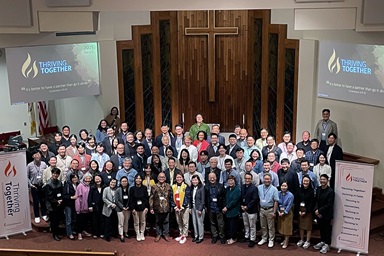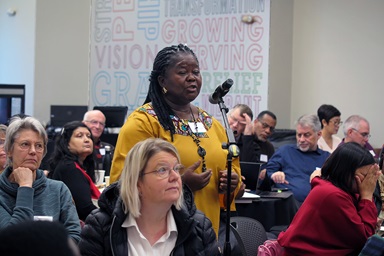May 17-19, in Prague, the Czech Republic
In the closing worship service, the congregation heard words in Czech and Slovak and also in English, sermon of the Bishop, and in Russian, songs.
The theme of the gathering was “Ask the Lord of the harvest to send out workers into his harvest field” (Luke 10:2). And indeed, the mission field in Czechia and Slovakia is getting more and more international. The Russian-speaking congregation and the English-speaking congregations of Prague have been established as separate circuits. In the city of Tachov, in the west of Czechia, there is a large group of Bulgarians, mostly Turkish-speaking Muslim Roma people. They are avoided by the rest of the population, and there is a very distinct xenophobia. However, the local United Methodist congregation offers harbor to a Christian Roma-congregation so that they can celebrate their worship services in the United Methodist church building.
Neither in Czechia nor in Slovakia, there is an excess of pastors. But it is reason to thankfulness that over and over people hear God’s call into the ordained ministry. Some of them originally come from other churches or had no pronounced church background before they became Christians. In addition, The United Methodist Church has been running, for many years already, a well-developed lay education program, which has encouraged many lay people to serve as lay preachers or to even start the journey into ordained ministry. In the closing worship service on Sunday, Petr Vaďura was ordained elder. For many years already, he has been involved in media ministry, and because of his interviews with famous people, he is known far beyond The United Methodist Church.
Czechia is a distinctly secularized country, while Slovakia is still very much shaped by the presence of the Roman-Catholic Church. Most Slovakian people claim themselves as Christians, but they do not practice Christian discipleship. In both countries, the pastors’ salaries have been paid by the State since the beginning of the communist time. This still applies to Slovakia, which results in the fact that The United Methodist Church can employ a considerable number of lay people. In Czechia, however, this State support is slowly fading out. A transitional arrangement leads to an annual increase of 50% of the local churches’ contributions towards the pastors’ salaries. It is reason to joy that almost all local churches have been able to accomplish this in the past years. Meanwhile, the State funds are invested in real estate in order to secure a long-term, stable income and to be able to support smaller churches, mission projects, and church development in the future.
Since all 2020 meetings of the Annual Conferences in Central and Southern Europe will take place after General Conference in May, the next meeting of Czechia-Slovakia Annual Conference is scheduled for June 19 to 21, 2020, in Prague.
— Bishop Patrick Streiff, Zurich/Switzerland
In the closing worship service, the congregation heard words in Czech and Slovak and also in English, sermon of the Bishop, and in Russian, songs.
The theme of the gathering was “Ask the Lord of the harvest to send out workers into his harvest field” (Luke 10:2). And indeed, the mission field in Czechia and Slovakia is getting more and more international. The Russian-speaking congregation and the English-speaking congregations of Prague have been established as separate circuits. In the city of Tachov, in the west of Czechia, there is a large group of Bulgarians, mostly Turkish-speaking Muslim Roma people. They are avoided by the rest of the population, and there is a very distinct xenophobia. However, the local United Methodist congregation offers harbor to a Christian Roma-congregation so that they can celebrate their worship services in the United Methodist church building.
Neither in Czechia nor in Slovakia, there is an excess of pastors. But it is reason to thankfulness that over and over people hear God’s call into the ordained ministry. Some of them originally come from other churches or had no pronounced church background before they became Christians. In addition, The United Methodist Church has been running, for many years already, a well-developed lay education program, which has encouraged many lay people to serve as lay preachers or to even start the journey into ordained ministry. In the closing worship service on Sunday, Petr Vaďura was ordained elder. For many years already, he has been involved in media ministry, and because of his interviews with famous people, he is known far beyond The United Methodist Church.
Czechia is a distinctly secularized country, while Slovakia is still very much shaped by the presence of the Roman-Catholic Church. Most Slovakian people claim themselves as Christians, but they do not practice Christian discipleship. In both countries, the pastors’ salaries have been paid by the State since the beginning of the communist time. This still applies to Slovakia, which results in the fact that The United Methodist Church can employ a considerable number of lay people. In Czechia, however, this State support is slowly fading out. A transitional arrangement leads to an annual increase of 50% of the local churches’ contributions towards the pastors’ salaries. It is reason to joy that almost all local churches have been able to accomplish this in the past years. Meanwhile, the State funds are invested in real estate in order to secure a long-term, stable income and to be able to support smaller churches, mission projects, and church development in the future.
Since all 2020 meetings of the Annual Conferences in Central and Southern Europe will take place after General Conference in May, the next meeting of Czechia-Slovakia Annual Conference is scheduled for June 19 to 21, 2020, in Prague.
— Bishop Patrick Streiff, Zurich/Switzerland
Like what you're reading? Support the ministry of UM News! Your support ensures the latest denominational news, dynamic stories and informative articles will continue to connect our global community. Make a tax-deductible donation at ResourceUMC.org/GiveUMCom.



